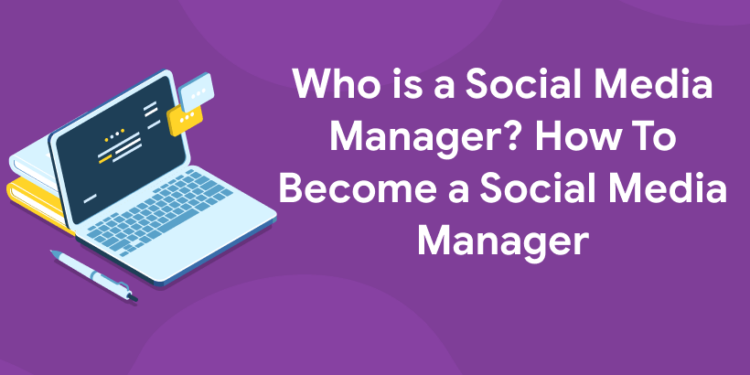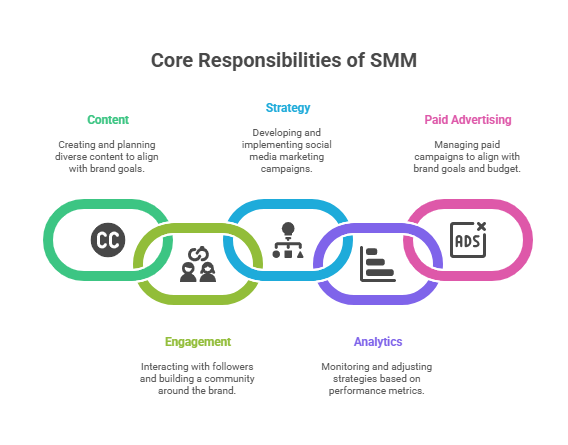Table of Contents
In a world where digital communication dominates how brands connect with audiences, the Social Media Manager (SMM) has become one of the most important roles in marketing and communications. From global corporations to startups, NGOs, and creatives, all need specialists who can turn simple posts into authentic brand stories, conversations, and conversions.
But what exactly does a Social Media Manager do? What skills are required, and what steps are needed for a successful career? This comprehensive guide demystifies the profession and outlines actionable steps to enter the field.
Key Takeaways:
- A Social Media Manager is responsible for building, engaging, and managing a brand’s presence across digital social channels, including creating strategies, publishing content, fostering community, and analyzing data to achieve measurable growth.
- The role blends communication, creativity, analytics, and technical marketing skills, and is in high demand across industries.
- To become a Social Media Manager, one needs foundational digital marketing knowledge, platform expertise, copywriting, design sense, community management, and ongoing learning.
- Continuous self-learning, certification, networking, and a robust portfolio are keys to launching and advancing in this dynamic field.
Who is a Social Media Manager?
A social media manager is the digital architect behind a brand’s online identity, responsible for crafting and executing strategies that engage audiences, build communities, and drive business goals across platforms like Instagram, TikTok, LinkedIn, Facebook, and X (formerly Twitter). In essence, they are the voice of the brand, blending creativity with data to create content that resonates while monitoring performance to ensure every post contributes to growth.
A Social Media Manager (SMM) is the professional tasked with:
-
Designing and executing the brand’s overarching social media strategy.
-
Creating and publishing content (posts, graphics, videos) on platforms such as Instagram, Facebook, LinkedIn, X (Twitter), TikTok, and YouTube.
-
Managing online communities, responding to messages, moderating comments, and maintaining a positive brand reputation.
-
Analyzing social data and making real-time adjustments.
-
Managing campaigns (organic and paid), influencer collaborations, and customer support on social platforms.
Learn Digital Marketing Fundamentals! Get Free Demo Here!
Core Responsibilities of SMM
1: What is the primary goal of SEO (Search Engine Optimization)?
A Social Media Manager is a jack of all trades, and the responsibilities can vary depending on the company size, industry, and goals. But here are the core duties:
1. Content
- Content Planning: Create a content strategy that aligns with the brand goals. This means planning what to post, articles, videos, photos, infographics, etc.
- Content Creation: Depending on the team size, the SMM may also design or write content. This includes crafting captions, writing blog posts, designing graphics, and shooting videos.
2. Engagement
- Audience Interaction: Engage with followers, respond to comments, answer DMs, foster positive interactions.
- Building Relationships: Build a community around the brand, encourage discussions, do polls, make followers feel valued.
3. Strategy
- Campaign Development: Develop and implement social media marketing campaigns, work closely with the marketing team to ensure it aligns with business goals.
- Scheduling and Posting: Manage posting schedules, make sure content goes out at the right times to get the most engagement.
4. Analytics
- Monitoring Metrics: Use tools like Google Analytics, Facebook Insights, Hootsuite Analytics to track performance. This includes engagement, reach, conversion rates, follower growth.
- Adjusting Strategies: Based on analytics, adjust the content strategy and posting schedules to improve results.
5. Paid Advertising
- Paid Campaigns: A growing part of the SMM’s job is to manage paid social media campaigns, Facebook Ads, Instagram promotions, LinkedIn sponsored posts. The manager ensures the campaigns align with the brand goals and budget and optimize for better performance.
Become an AI-powered Digital Marketing Expert
Master AI-Driven Digital Marketing: Learn Core Skills and Tools to Lead the Industry!
Explore CourseEssential Skills Needed for SMM
-
Creativity & Visual Literacy: Eye for design and storytelling.
-
Writing & Communication: Clear, engaging, and error-free copy.
-
Analytical Mindset: Ability to interpret metrics and refine strategy.
-
Technical Proficiency: Familiarity with scheduling and analytics tools (e.g., Buffer, Hootsuite, Meta Business Suite, Canva).
-
Crisis Management: Ability to address negative feedback tactfully.
-
Multitasking & Organization: Juggling multiple platforms, campaigns, and deadlines seamlessly.
How to Become a Social Media Manager
Becoming a Social Media Manager is possible if you’re willing to learn and gain experience. Here’s a step by step guide:
Step 1: Gain Education and Knowledge
A degree isn’t always necessary but a solid understanding of marketing, communication and business principles is important. Many SMMs come from public relations, journalism or communications backgrounds but you can also gain knowledge through online courses and certifications.
Entri’s AI-Powered Digital Marketing Course is a great way to gain a solid foundation in social media management. This course covers a wide range of digital marketing skills from social media strategy to content creation and analytics. Through Entri’s course, you’ll learn how to design campaigns and manage social media platforms professionally.
Step 2: Build Practical Experience
Theoretical knowledge is important, but hands-on experience is essential for a career in social media management. You can gain practical experience in the following ways:
- Internships: Many businesses offer internships where you can work under an experienced SMM.
- Freelance Work: If you want to build a portfolio, starting as a freelance social media manager can help you get hands-on experience. Offer your services to small businesses, startups, or personal brands.
- Personal Projects: Another way to gain experience is by managing your own social media profiles or blog. Running your own accounts will give you insight into social media strategy, content creation, and community management.
Step 3: Learn the Tools of the Trade
Familiarize yourself with the social media tools that professionals use. Some of the most popular tools are:
- Hootsuite or Buffer: For scheduling posts across multiple platforms.
- Canva: For designing visuals and graphics.
- Sprout Social: For detailed analytics and reporting.
- Google Analytics: For tracking website traffic and understanding the impact of social media campaigns on business metrics.
Step 4: Develop a Personal Brand
As a Social Media Manager it’s important to build your own personal brand. This means:
- Creating a strong online presence: Be active on social media and showcase your expertise by sharing valuable content.
- Networking: Connect with other social media professionals and potential clients. Building relationships will help you land opportunities and stay updated on trends in the field.
Step 5: Stay Updated with Trends
Stay up to date with trends. Stay sharp by following social media news, experimenting with emerging features (like Threads or new IG tools), and collecting relevant certifications.
How the Entri Digital Marketing Course Accelerates Your SMM Career
Entri’s program is built for 2025’s digital landscape, designed by real-world experts. Here’s why it stands out:
-
Comprehensive Syllabus: From content strategy to analytics, storytelling to paid campaigns, tailored for beginners and upskillers.
-
Hands-On Projects: Run simulated campaigns; measure results using popular marketing tools.
-
Tool Mastery: Practical exposure to Canva, Hootsuite, Meta Suite, Google Analytics, and more.
-
Portfolio Development: Guidance on documenting and showcasing your campaigns and successes.
-
Placement Assistance: Support to land jobs or paid projects as you complete the course.
-
Flexible, Vernacular Content: Courses available in multiple South Indian languages, plus Hindi and English, reflecting Entri’s commitment to accessibility.
Whether you are switching careers or upskilling for promotion, Entri primes you for success in the competitive world of social media management.
Unlock the Power of Digital Marketing! Join Our Free Trial Course Today.
Become an AI-powered Digital Marketing Expert
Master AI-Driven Digital Marketing: Learn Core Skills and Tools to Lead the Industry!
Explore CourseFuture Trends in Social Media Management
-
Social Commerce: Integration of e-commerce directly onto social platforms (Instagram Shops, Facebook Marketplace).
-
AI and Automation: Automated posting, AI-generated insights, and dynamic ad copywriting.
-
Video Dominance: Short-form video and live-streaming are maintaining massive growth.
-
Data Privacy: Navigating new platform policies and global privacy standards.
-
Performance Analytics: Real-time reporting and dashboarding for campaign ROI.
-
Niche and Private Communities: Growth of closed groups, Discord servers, and subscriber-only channels.
-
Employer Branding: Companies investing in employees as brand advocates.
Career Opportunities and Salary of a Social Media Manager
The demand for social media managers is on the rise, driven by the increasing importance of social media in marketing and customer engagement. A career in social media management offers various opportunities across different industries.
Career Opportunities
-
Social Media Manager: The core role is responsible for managing a brand’s presence on social platforms.
-
Community Manager: Focuses on building relationships with followers and fans, often seen in gaming or tech industries.
-
Social Media Strategist: Develops long-term strategies and campaigns for brands.
-
Social Media Content Creator: Specializes in creating engaging content (photos, videos, and graphics).
-
Paid Social Media Manager: Focuses specifically on managing paid social media campaigns, such as Facebook Ads or Instagram promotions.
Salary Expectations
The salary of a Social Media Manager can vary depending on experience, location, and the industry they work in. On average, a social media manager earns between 8,00,000 to 10,00,000 annually. However, experienced professionals working in large agencies or high-profile brands can earn significantly more.
Freelance social media managers can set their own rates, which vary based on the client’s needs and the scope of the work.
Conclusion
A Social Media Manager is a hybrid creator, strategist, analyst, and communicator, integral to any ambitious brand’s growth in 2025. If you’re passionate about crafting stories, analyzing trends, and building online communities, this role is for you.
Build your foundation with real experience, continuous upskilling, and recognized certification, like Entri’s Digital Marketing Course, to confidently enter and thrive in the social media landscape.
Frequently Asked Questions
What does a social media manager actually do?
A social media manager plans and creates content, engages with followers, analyzes data, and shapes the brand’s online personality across different platforms.
Which skills are most important for a social media manager?
Creativity, strong communication, analytical thinking, knowledge of digital trends, organization, and adaptability are must-haves for this fast-paced role.
What platforms do social media managers need to master?
Instagram, Facebook, X (Twitter), LinkedIn, YouTube, TikTok, and emerging platforms relevant to your target audience each have unique expectations.
Is a degree required to be a social media manager?
While some employers prefer degrees in marketing, communication, or business, a strong portfolio and proven results can be just as important, especially with project-based courses like those from Entri.
How can I build experience if I’m new?
Start by managing your own passion projects, volunteering for NGOs, or doing freelance work; save your successes as proof of your skills.
Why is analytics so important for social media managers?
Understanding what works (and what flops) allows managers to tweak strategies, improve content, and prove ROI to bosses and clients.
What’s the difference between a social media manager and a content creator?
A content creator focuses on making videos, images, or blogs. A social media manager strategizes, schedules, analyzes, responds, and manages the overall brand voice.
What certifications help me become a social media manager?
Certifications from leading courses, like the Entri Digital Marketing Course, Google, HubSpot, or Facebook Blueprint show commitment and expertise.
How do I keep up with the fast changes in social media?
Follow industry blogs, join online communities, attend webinars, and always be experimenting with new trends and tools.
Can social media managers work remotely or freelance?
Yes! Many pros work with multiple brands, agencies, or as digital nomads, making this career both flexible and global in scope














